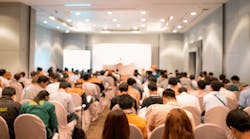In-person events are picking up, and I for one am pleased as punch—after shooing away a few yellowjackets and fishing a couple more out of the bowl.
Similar to many of us, I didn’t miss the Day of the Locust-like swarms at the airport and other grim realities of airline travel during the past two-plus years. However, it still beats walking, taking the bus with the usual convicts and old ladies, or driving—but only if the drive is longer than five or six hours, which I'm inclined to extend to eight or 10 hours.
Nonetheless, I think dealing with these obstacles is totally worth it because I’m unchained from the desk, I mean dining room table, “out of my cage,” and on the street again. Amazingly invigorating! But why?
I spend almost all my interacting and interviewing time on the phone, and that basic scenario remained the same before, during and after the COVID-19 pandemic. Similar to everyone, I attended a lot more Teams, Zoom and other on-screen meetings—and I enjoyed all the friendly faces. But there was also something missing, if not entirely derailed out of whack, and I’m not the only one who thought so.
After a few on-screen gatherings, especially several in one day, l noticed an unexpected weariness. I soon heard the term “Teams fatigue,” which echoed back to the “Death by Power Point” of yesteryear and its seemingly endless slide presentations, which can still be an occupational hazard today.
But again, why? Why this weary feeling that some cylinders aren’t firing or that not all the wheels are on the track? Beyond the slides, the only similar situation I could recall was the uneasy, lethargic and slightly atrophied feeling after watching too much TV or a double or triple feature at the movies. Remember? Whatever type of display (or HMI) is viewed, I think too much screen time is unnerving because few of our other senses are engaged, and our hunter-gatherer biology wants us to be outside using all of them.
However, visual media including sight itself grabs too much attention, focus, credit and mental resources. Granted, sight and hearing give us the vast majority of our useful information (and the illusion of 3D), but they’re just images and sounds that aren’t fleshed out onscreen by touch, taste and especially smell.
That’s why live theater and sports are always better. Being in groups, whether they're in plants, offices, conferences or anywhere, is preferable because there’s a better chance for all our senses to play off each other—and other people. I believe experiencing audience reactions might be as essential as air, water and food.
Likewise, it's well known that involving more senses is far better for learning, comprehension and retention. I’ve also heard that being deprived of sight somehow “heightens” other senses, but I think it might be more truthful to say that we stop ignoring our other senses when our eyes aren’t hogging all the bandwidth.
Admittedly, models, simulations, digital twins, and assisted and virtual realities (AR/VR) are quickly gaining power, resolution and sophistication. And they’ll no doubt continue to reproduce reality in ever greater detail and with ever more physical forces and phenomena represented. Beyond better data analytics, this is likely where the Internet, networking and increasingly powerful software and microprocessors will help out the most. That said, all these representational realities still have a long way to go.
So, let’s stir our stumps. Get out and into more live situations, even if there are some obstacles in the way. And the ugly, possibly menacing crowd at the airport? They became surprisingly better looking after a few minutes, so maybe it was my perspective that changed as my reticence and suspicion abated.
Plus, I won’t even mention the aerobic benefits of getting out and pulling some ground under our feet, which by the way, is the biological basis, framework and fuel for those very senses that are hungry for some input.






